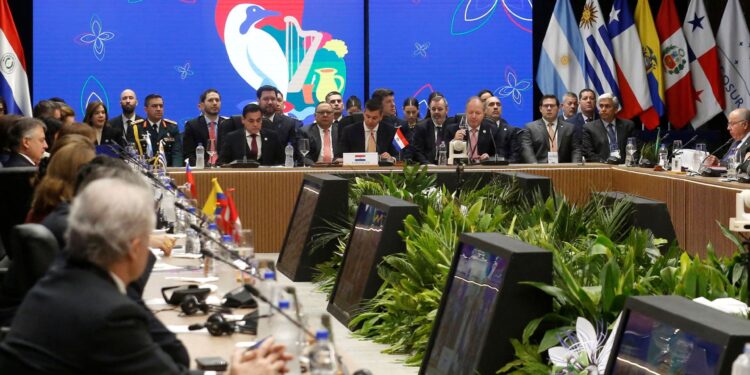Aljazeera.net correspondents
Asuncion, the capital of Paraguay, hosted the summit of the South American Common Market (Mercosur) yesterday, Monday, with the attendance of the leaders of Brazil, Uruguay, Paraguay, and Bolivia, which officially joined the group.
The meeting was also attended by a representative of Argentine President Javier Milei, who refused to attend after describing Brazilian President Lula da Silva as a “communist and corrupt” and refusing to apologize for that.
Brazil had submitted a request to Paraguay, the current rotating president of the organization, to ratify the request for a free trade agreement with the State of Palestine.
The Brazilian request was preceded by a request submitted by Palestine on April 30, 2024, and the agreement stipulates that it will enter into force 30 days after its official adoption yesterday, Monday.
The agreement comes after a framework agreement was signed in late 2011, but it did not enter into force at that time.
Regarding the explanation for the delay in adopting the agreement since 2011, Brazilian journalist Fabio Bosco told Al Jazeera Net that the agreement was not adopted at that time by the four Mercosur countries, because there has been a free trade agreement between the organization and Israel since 2010, and a huge trade exchange, which prompted widespread popular campaigns against this agreement, but all of that did not deter the governments from moving forward.
Bosco continued, that the agreement between one of the organization’s members and another party, such as Palestine or others, does not obligate the organization to anything, and this explains why the agreement has not entered into force to this day, which apparently came as a response to the broad popular campaigns against the Israeli aggression against the Palestinian people that we have witnessed in many Latin American countries.
Al Jazeera Net contacted the Brazilian Ministry of Foreign Affairs to understand the content of the agreement, and the press office at the ministry responded that “the agreement mainly includes the following issues:
- Commodity trading.
- Rules of origin.
- Bilateral guarantees.
- Technical regulations, assessment standards and procedures and compliance.
- Sanitary and phytosanitary measures.
- Technical and technological cooperation.
- Institutional arrangements and dispute resolution.
The agreement aims to open markets for goods, with an evolutionary clause on the possibility of reaching future understandings on access to services and investment markets.
While the Brazilian government stated on its official website that this agreement represents a tangible contribution to the establishment of an economically viable Palestinian state, capable of living in peace and harmony with its neighbors.
According to the website of the “Official System for Extracting Statistics of Brazilian Foreign Trade in Goods”, Brazilian exports to Palestine in the first half of this year were worth 16.9 million US dollars, or 0.01% of total Brazilian exports, 96% of which are fresh, frozen or processed meat, which is the highest figure in inter-trade in years.
While Palestinian exports to Brazil did not exceed $193,000, 37% of which were vegetables and fruits, and 61% were simple industrial materials such as multi-purpose fans and some air conditioning and refrigeration equipment.



